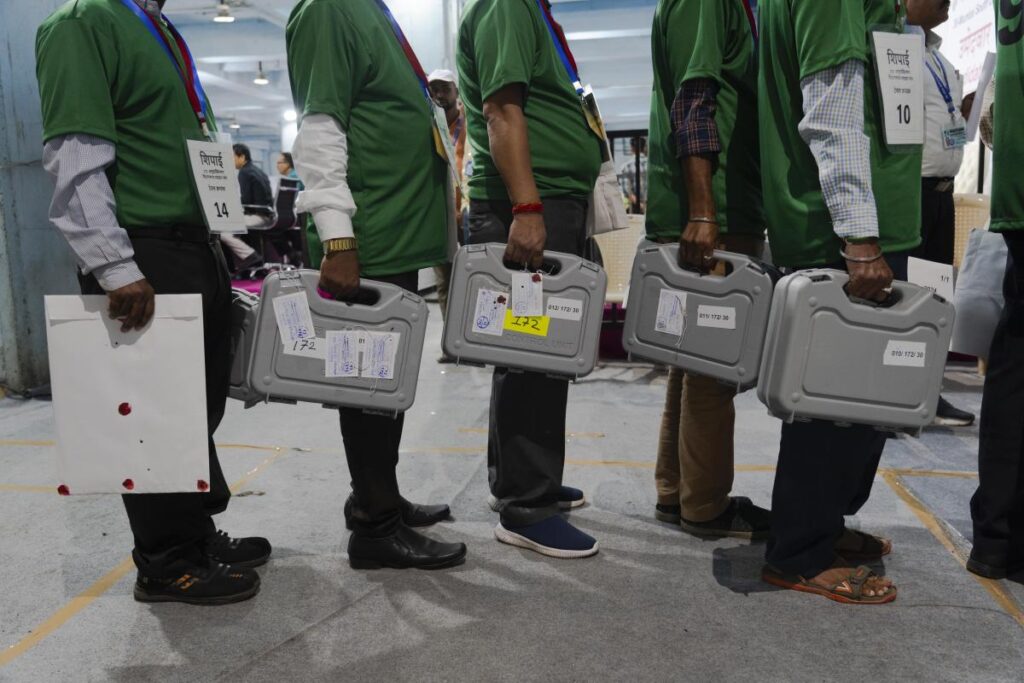NEW DELHI (AP) — Prime Minister Narendra Modi’s coalition won a majority of seats on Tuesday The general elections in Indiaaccording to early figures, but faced a bigger challenge from the opposition than expected after it pushed back against the leader’s mixed economic record and polarizing politics.
The count of more than 640 million votes cast in six weeks the world’s largest democratic exercise would take all day. Modi was still widely expected to be elected to a third five-year term — even as the contest tightened and early tallies showed his Hindu nationalist party might not be able to win a majority on its own.
If Modi wins, the 73-year-old would become one of the country’s most popular and important leaders. It would be only the second time that an Indian leader has retained power for a third term, after Jawaharlal Nehru, the country’s first prime minister.
In his ten years in power, Modi transformed India’s political landscape Hindu nationalismonce a fringe ideology in Indiaentered the mainstream, while leaving the country deeply divided.
His supporters see him as a self-made, strong leader who has improved India’s position in the world. His critics and opponents say his own Hindu-first politics have spawned intolerance while the economy, the fifth largest and one of the fastest growing in the world, has become more unequal.
Some seven hours after countingEarly indications from India’s Election Commission showed that Modi’s Bharatiya Janata Party was leading in 236 constituencies and had won two, including one uncontested, of the 543 parliamentary seats. The main opposition party, Congress, was in charge in 99 constituencies.
A total of 272 seats are needed for a majority. In 2019, the BJP won 303 seats.
Modi’s party is part of the National Democratic Alliance, whose parties led in 287 constituencies, including the two won by the BJP, according to the initial count. The Congress Party is part of the INDIA Alliancewho led in 230 constituencies.
The election commission does not release data on the percentage of votes tallied, and initial figures were expected to change.
The “Congress Party and other opposition parties have shown tremendous resilience. Having a stronger opposition is a good sign for Indian democracy, which took a hit during Modi’s 10-year rule,” said political analyst Rasheed Kidwai.
Exit polls over the weekend had predicted the NDA would win more than 350 seats. Indian markets, which hit a record high on Monday, closed sharply on Tuesday, with benchmark stock indices – the NIFTY 50 and the BSE Sensex – both down more than 5%.
Extreme heat hit India as voters went to the polls, with temperatures exceeding 45 degrees Celsius (113 Fahrenheit) in some parts of the country. Temperatures were somewhat cooler for the counts on Tuesday, but election officials and political parties still took precautions by bringing in large amounts of water and installing outdoor air coolers for people waiting for results outside vote-counting buildings and party headquarters .
BJP workers outside the party office in New Delhi performed a Hindu ritual shortly after counting began. Meanwhile, supporters at the Congress party headquarters appeared optimistic and chanted slogans praising Gandhi, the party’s campaign face.
In his decade in power, Modi’s popularity has surpassed his party’s and turned parliamentary elections into elections that increasingly resemble Election Day. presidential style campaign. The result is that the BJP is increasingly reliant on Modi’s enduring brand to stay in power, with local politicians fading into the background even in state elections.
“Modi was not just the main campaigner, but the sole campaigner of this election,” said Yamini Aiyar, a public policy scholar.
The country’s democracy, Modi’s critics say, is faltering under his government, which has increasingly employed strong-arm tactics to subdue political opponents, pressure independent media and quash dissent. The government has rejected such accusations and says democracy is flourishing.
And economic discontent has simmered under Modi. As stock markets reach record highs and the number of millionaires increases, youth unemployment has soared only a small portion of Indians take advantage of the flowering.
When the polls opened in mid-April, there was initially a confident BJP his campaign on “Modi’s Guarantees,” highlighting the economic and prosperity achievements that his party says have reduced poverty. With him at the helm, “India will become a developed nation by 2047,” Modi reiterated at rally after rally.
But the campaign became increasingly strident as Modi ramped up the polarizing rhetoric it targeted Muslims, who make up 14% of the population, a tactic that would energize his core Hindu majority voters.
The opposition INDIA Alliance has attacked Modi for his Hindu nationalist politics and campaigned on issues such as unemployment, inflation and inequality.
But the broad alliance of more than a dozen political parties has been beset by ideological disagreements and defections, raising questions about its effectiveness. Meanwhile, the alliance has also claimed that this is the case unfairly targeted, pointing to a series of raids, arrests and corruption investigations against their leaders by federal agencies that they say are politically motivated. The government has denied this.
___
Associated Press writer David Rising contributed to this story.

